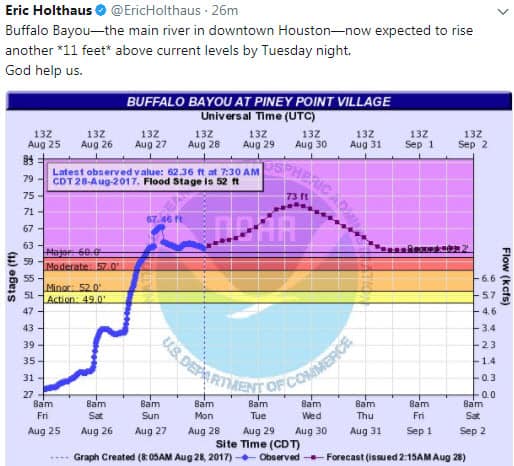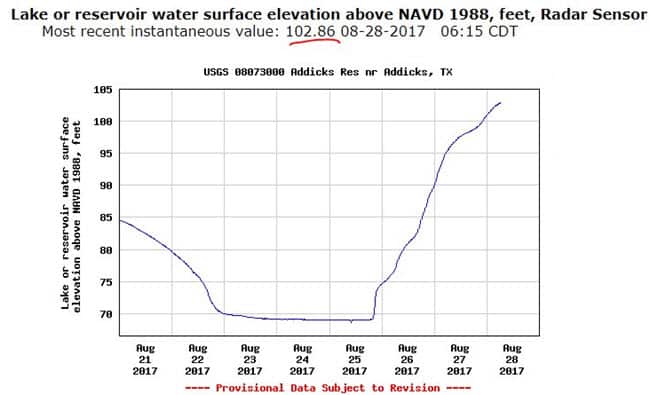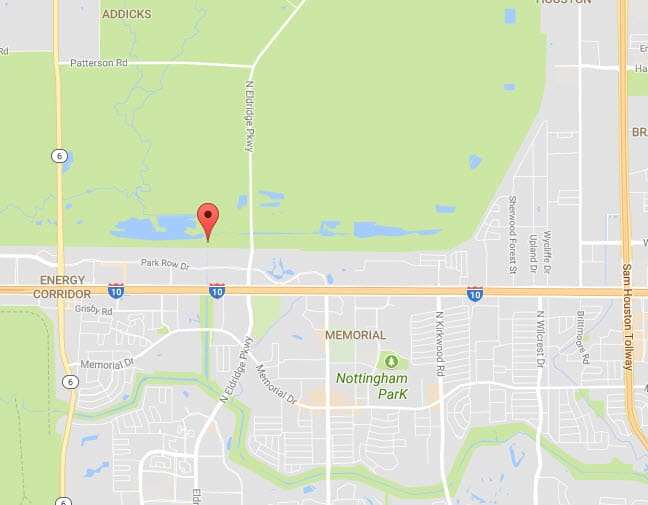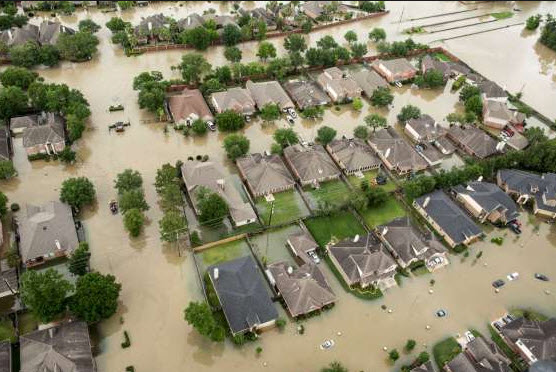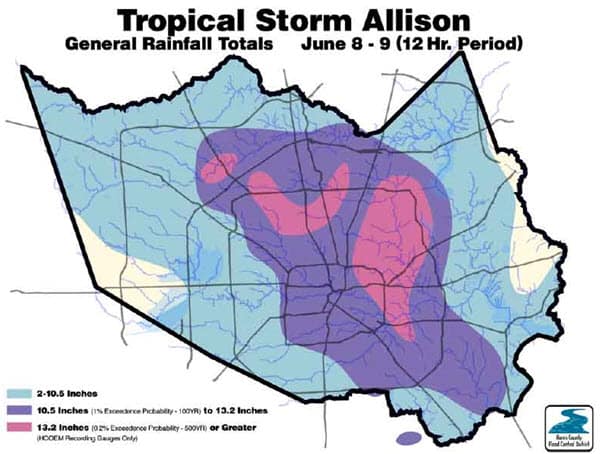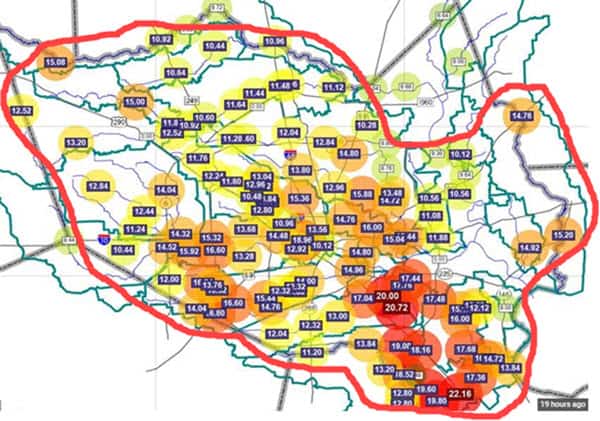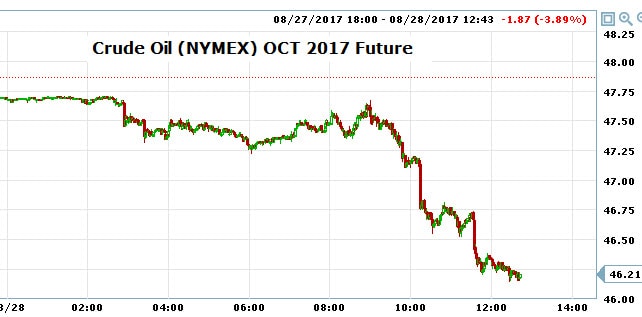Superstorm Harvey continues to wreak epic damage to Texas, particularly Houston.
But it’s not the wind, it’s the rain. Epic, record-breaking, unbelievable amounts of rain.
It’s entirely possible that the entire region will not get back ‘to normal’ for months, if not years.
Vice President Mike Pence noted that given the “magnitude of the flooding” that “it will be years coming back.” (Source)
Tens of thousands of homes are flood damaged, many of them total losses. Only one-in-six Houston residences is thought to have flood insurance.
FEMA Director Brock Long said 30,000 are in temporary shelters with 450,000 expected to seek assistance. That may well grow if Harvey cycles back for another hit, which is quite likely at this time (see below).
The entire city of Houston is deserted except for rescue vehicles. So a major American city is not at work today. Or tomorrow. Or....???
A significant portion of the nation’s energy infrastructure is directly impacted by Harvey’s biblical rains and current total shutdown. Crude oil will accumulate there as refineries are unable to process it into fuel products. The prices for those same fuel products has been rising and will continue to spike higher. If this goes on for long enough, actual shortages will result.
The only mitigating factors working against the accumulation of crude at storage farms is the shutdown of wells in the Gulf as well as possibly a few wells in Texas' Eagle Ford region, for which no back-up power exists at the well sites. I don’t have any information on how extensive that might be yet. I'm just guessing at this point.
Rivers in Houston are not expected to crest until Tuesday, at some 11 feet (!!) higher than their current “major flood” stage (forecast as of 2:15 a.m. August 28th, 2017).
There’s no historical parallel for this level of flooding, so we’ll just have to wait and see how this all plays out.
The good news is that the past 24 hours have seen relatively little rainfall (just under an inch).
The really bad news is that the latest models show Harvey heading back into the Gulf, picking up more moisture and power, possibly becoming a hurricane again, and then coming back ashore aimed straight for a second savaging of Houston:
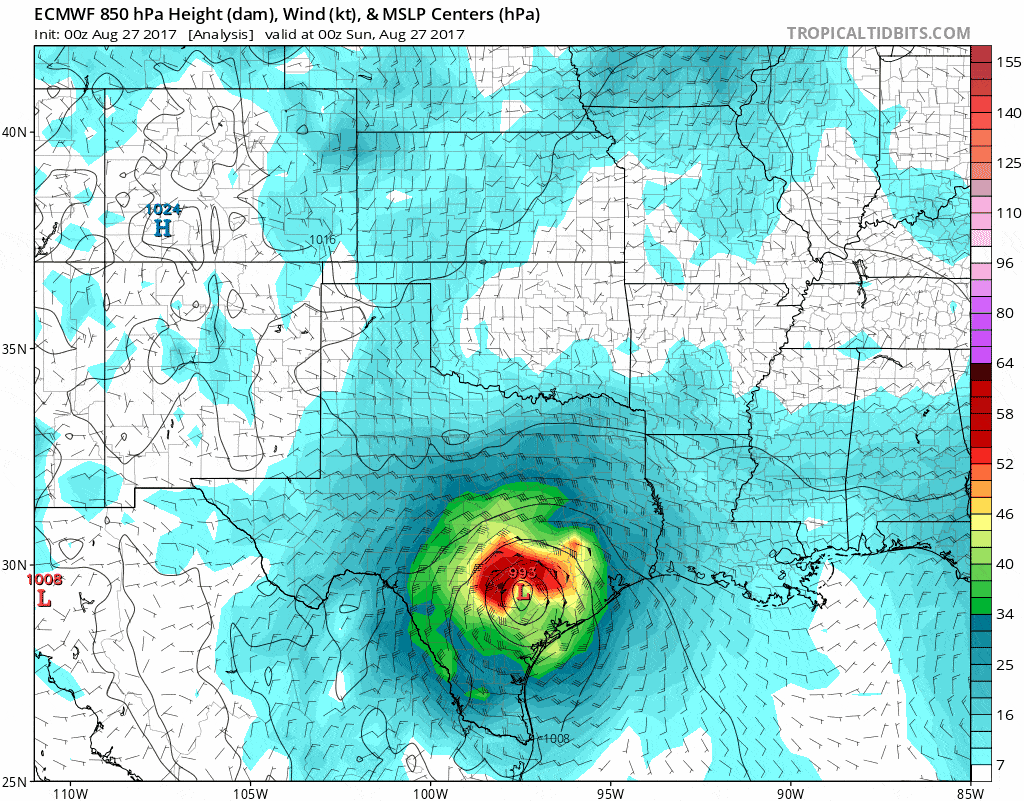
That would be thoroughly cruel to those who's lives have already been upended by this storm. But nature can be rather remorseless that way.
As the WSJ put it this morning:
HOUSTON—Tropical Storm Harvey was poised to re-enter the Gulf of Mexico Monday and make another landfall closer to Houston roughly two days later, prolonging the slow-motion flooding disaster that already has crippled one of the nation’s largest metropolitan areas.
The storm, still over coastal Texas, is not expected to regain hurricane strength as its eye moves back over water, according to the National Hurricane Center. But its plodding, easterly track means as much as 20 more inches of rain could fall on the Houston area. The region has seen as much as 30 inches in recent days, turning roads into rivers, inundating homes and requiring rescues for thousands of stranded people.
The historic rains, already more than half of what Houston gets in a typical year, were forcing officials to make painful decisions to evacuate flooded areas—and to release water from reservoirs under strain, knowing that it would flow into nearby neighborhoods
20 more inches might fall. This is really without any precedent. It’s a very serious situation and people are mostly shocked and unable to process the enormity of this at the moment.
The last part in bold above is really concerning. The reservoirs in the region are all completely full, or in never-before-seen record territory. If you live downstream from one of these you really ought to consider evacuation.
Here’s one that has hit a new record:
That’s a brand new record high for the reservoir. Here’s some info on it.
The Addicks Reservoir and Addicks Dam in conjunction with the Barker Reservoir prevent downstream flooding of Buffalo Bayou in the City of Houston.
From 2008-2014, the U.S. Army Corps of Engineers Galveston District implemented $4.4 million in interim risk reduction measures (at Addicks and Barker dams) to address deficiencies until long-term solutions could be identified and executed.
In 2014, staff completed a Dam Safety Modification Study to evaluate long-term repairs and address issues associated with the dams. Staff presented this information during a public meeting Oct. 29 at Bear Creek Community Center in Houston to discuss these plans and gather feedback. Construction is scheduled to begin May 2015 with an estimated completion date of 2019.
(Source)
It’s too bad that the dam remediation efforts were still 2 years away from completion as that dam is now being severely tested. All people the Buffalo Bayou area are strongly advised to consider evacuation.
Here’s the reservoir mapped:
“Controlled” releases are already underway and people have been asked to voluntarily evacuate.
The Harris County Flood Control District announced on Sunday night that they will have to open the Addicks and Barker reservoirs to relievesome of the pressure on Monday morning. Because of these releases, voluntary evacuations are being issued for people who live near the two reservoirs.
(Source)
It remains to be seen if the releases can keep up with the rainfall. I don’t have any good information on that at present, but will keep researching.
Evacuating is a really big deal and not to be undertaken lightly. The main reason is that you aren't evacuating alone, but along with hundreds of thousands if not millions of other people.
Here’s an especially thoughtful post on the topic that I came across on Reddit early this morning:
I lived through several storms on the Gulf through the years and I can shed a bit of light on the topic.
For one thing, evacuating is expensive.
Factor in the weeks without work. Yes, weeks. Because even if you do manage to make it out of the path of the storm (which isn't a guarantee unless you travel hundreds of miles), there's no promise you'll be able to return home in a timely manner. Roads wash out, gas stations run out of gas and lose power, entire towns shut down.
The actual act of transporting yourself somewhere else is a challenge. Cars sit bumper to bumper, filling every highway and every lane. You've got to leave early enough to actually make progress, or else you'll be caught in the road when the storm hits. I was in Johnson Bayou days before Hurricane Gustav hit. I was driving from an EMT outpost to the corner store, a drive which normally took 20 minutes. It took me 8 hours, all because of evacuee traffic.
If you do decide to leave, there's no guarantee you'll still have a job to return to.
Then there's the sudden cost of a hotel room for weeks on end. Everywhere that's out of the direct path of the storm is full, I mean packed to the utter brim, no more rooms in Bethlehem and no more mangers either.
Everyone ELSE who's decided to evacuate is headed to the same spots, and these aren't luxurious destination locals. You go just far enough to get away, which sometimes puts you and your family in the middle of some podunk town that's totally not equipped to handle a massive influx of people.
So if you do find a room, which is tough, it's expensive.
If you go the shelter route, and you evacuate to a designated area, well buckle up. You're in for a few weeks of sharing cramped quarters with lord knows how many folks, all while you're unlikely to have access to things like showers or washing machines.
Then there's the drive itself. Timing an evacuation isn't just expensive, it's really tricky. Yes, for days and days we track the storm as it builds in the Atlantic and closes in on the shore. The people down south are probably more savvy at it than you realize, and for good reason! Their lives could depend on it every single summer.
But these storms are incredibly hard to predict with extreme accuracy.
The margin of land area that these storms could hit in storm projections is laughably huge at first. Then, as the week closes and the storm draws nearer, the land mass gradually narrows as possible outcomes are ruled out.
The last 4 days are where its most critical. You spend those days glued to your TV screen and your radio. Every waking minute you are on red alert, thinking about and prepping for this storm.
You have this small window of time in which you have to weigh the massive costs and stresses of evacuating against the actual level of threat posed to your life.
Actually getting on the road, if you do decide to evacuate, is STILL not a guarantee that you'll be out of danger. Once these storms make land fall, the amount of moisture they drop can cause severe flooding all the way up to Canada in the most extreme cases. So what if you run away, only to get caught in disaster somewhere else?
And then there's the tragic cases -- elderly folks too old to go through the arduous process if paving and leaving their homes in the face of a storm, and without a living relative to help them do it, or people who live hand to mouth, pay check to pay check, with not enough money to leave.
It's incredibly risky to stay, and incredibly difficult to run. And sometimes these storms come one year after another, so that if you end up evacuating one summer, you might not be in a position to do it the next, either because of finances or putting your job on the line. And then there's the ever-present worry that you're going through all this hassle for no reason; for a storm that'll just fizzle out in the Gulf and veer off to hit somewhere else at the last second, which makes you less inclined to listen to the next warning, and the next.
(Source)
Lights Out
The biggest problem for the modern lifestyle is just how hard it is to live life without electricity. For starters there’s the loss of utility power. Here’s the latest data:
The former Hurricane Harvey continues to trigger power outages across Texas. As of 7:25 a.m. CDT on Monday, August 28, there are more than 302,000 electricity outages across Texas, according to the Data Fusion Solutions power outage tracker map. That’s down by about 14,000 since Sunday, August 27.
(Source)
So a bit over 300,000 structures are without power. How many people are directly affected by that is probably close to a million, assuming 3-4 people per structure.
But even once the power gets turned back on, that’s not going to help many of the folks who own houses that are in areas like these:
The reason why is contained in another excellent Reddit post by an electrician:
Now, lets talk about the dangers of having power in a flooded house. These people are taking their lives into their own hands here. ANY electrical that's been exposed to water, especially breaker boxes is considered damaged beyond repair and MUST be replaced. Why? Corrosion. All these contacts, especially with active voltage and current in the lines, are corroding as we speak.
ALL wiring and components will have to be replaced, it is part of the restoration process to get your power restored to the house.
(Source)
Now imagine possibly tens of thousands of homes that all need to have their wiring replaced before the lights can go back on and you have a sense of the scale of the problem. It’s huge.
To the extent that any utility substations got water damaged, this same poster had this to say:
Next, we'll talk about what's happening to the grid in these areas. Power comes to your house via a substation, any of these substations that went underwater, whether these cables were buried or not, will have to most likely be ripped out and be replaced.
Oy. It could be a very, very long time before some areas and certain customers will see any power restored.
So the power outage factor is going to make Houston a very unlivable place for any and all affected customers for weeks to months to possibly years depending on circumstances.
Given that Houston is basically a hot, humid swamp with a mosquito problem most people will rightly conclude that it’s just not livable without power for any length of time.
Some Context
The worst storm on record for the area was tropical storm Alison in June of 2001. It was calculated at the time to be a 1-in-500 year event.
Well, that lasted 16 years and 2 months before being shattered.
Here are the rainfall totals from Alison:
Note that the purple and pick areas represent rainfall totals of over 10 (purple) and 13 (pink) inches.
Now, for comparison, here’s the Harvey totals through Sunday. I have helpfully circled in red the areas that had more than ten inches of rain. It’s practically the entire region!
There are a huge number of dots on the Harvey chart that are already over 15” and even 20”. That means that Alison, 1-in-500 year event that it was, is not even remotely comparable to Harvey.
Because Alison caused $9 billion in damage, we’re going to have to scale that up by some factor…let’s start with 10x? And that’s just to date. If Harvey cycles back out-and-around who knows just how much more serious this could all get?
At any rate, now that 1-in-500 year events are happening far more frequently than that, we now have to consider that past weather history is not a useful guide for us anymore.
One Out Of Six
A huge, looming, possibly fiscally-ruinous problem here is that very few Houstonians are actually insured for floods. The following article ran on our Daily Digest a few days ago:
How Hurricane Harvey Could Cause Long-Term Devastation
Aug 26, 2017
Beyond the Category 4 130 mile-an-hour winds, the devastating eye wall, and the storm surge hundreds of miles wide, the most destructive part of Hurricane Harvey as it bears down on the Texan Gulf Coast might be the rain.
The most likely outcome, unless the storm takes an unexpected turn, appears to be tragedy. The region is already inundated. Houston’s already seen abnormally high amounts of rain this August, and parts of Louisiana are still flooded after rain storms earlier this month, a situation that left parts of New Orleans under several feet of water after some of the city’s water pumps failed. For now, the best case scenario is to hope that most people have evacuated, and that the storm and flood’s ravages will come against property and not human lives. After all, houses can be rebuilt.
But this time, even that may not be true. Although Texas and Louisiana—owing to the constant threat of floods—are among some of the places in the United States where flood insurance is most prevalent, there are few places where even a quarter of all homes are covered. In Houston,just over 119,000 places are covered by flood insurance policies backed by the National Flood Insurance Program, which helps fund most flood insurance policies. There are just over 800,000 occupied housing units in the city, which means that somewhere under a sixth of all homes in the city have flood insurance. The situation is the same in Corpus Christi, where 19,183 buildings are insured of around 115,000 occupied housing units.
The dearth of flood insurance policies makes the result obvious: Most people who lose homes or have them damaged in Harvey won’t have money to replace or repair them.
(Source)
Merely one out of six homes being insured is a huge predicament. Said the other way, 5-out-of-6 homes *not* being insured means that a huge number of people will simply abandon their homes and wander away, never to return, exactly as happened after Katrina.
The economic impact to Houston is going to be severe. Few can appreciate just how serious at present.
When A 15% Haircut Can Really Hurt
Energy is a finely-tuned and sensitive business, especially the oil business. Keeping a narrow balance between oil and gasoline and diesel stockpiles is an art form.
Slight disturbances in either oil (the feedstock) or the products (gasoline and diesel) can really impact the prices for both.
In this case, oil is still being produced, the tank farms are already pretty full, and a whopping 15% of the nations refinery output is currently offline due to Harvey:
Energy Firms Brace for Harvey Fallout
Aug 27, 2017
Harvey knocked almost 15% of U.S. refinery capacity out of commission, which threatens to boost fuel prices across the country.
Energy markets could be in for a bumpy ride when they open Monday as investors try to gauge the impact of the disruption. After slamming into Texas on Friday and causing massive flooding in Houston over the weekend, the storm was moving east on Sunday toward a refining hub near the Louisiana border. That could shut down even more of the U.S. energy infrastructure.
(Source)
Already the US oil markets are getting hit pretty hard here early on Monday, down nearly -4%:
Gasoline has increased by a similar amount of +4%. If Harvey continues to create disruption, these price moves are just the beginning. Expect both to continue in their current trajectories, especially if any serious or lasting damage has been done to the electricity infrastructure supplying the refineries. (I don’t have any information on that at present.)
More to come…
Preparation Is Essential!
As always, preparing before a disaster is cheap and honorable. Afterwards it’s expensive (if not impossible) and irresponsible if it becomes a “me vs. them” hoarding operation.
It's a little eerie how quickly our advice from just last week, Better A Year Early Than A Day Too Late, has been validated by Harvey.
The basic preparations that Adam and I outlined in our book Prosper! would have served anyone and everyone well in the affected areas had they followed them before Harvey hit. Certainly, there might be some losses of carefully-manicured gardens and such because, hey flooding, but all the rest would have been net positives.
Being in shape, having stored food, back-up energy sources like solar, rechargeable batteries, and generators, and a supportive community network would each proved to be useful and -- in combination -- invaluable.
Like with Hurricane Sandy, there will be an enormous number of people interested in preparing for a couple of weeks after this disaster passes. Then the decay function will hit, and barely 2% to 3% will actually take any real concrete steps on their own behalf once the lights come back on.
I’m looking forward to hearing from our affected members. The good the bad and the ugly. What worked, and what didn’t?
Conclusion
This was a relatively hastily-compiled report; such is the nature of fast-moving events. I will be providing additional data, insights and comments in the comment areas below as we work to keep up with developments.
Harvey has dealt a serious blow to the Houston area and, by extension, the entire US. And the situation is still developing, meaning it could get a lot worse before it gets better if Harvey comes back around for another swipe.
The US, as well as the world, really has to begin to grapple with the idea that “once in 500 year” events are actually more like “once in a decade” events now.
How we can really plan and prepare for these events is an enormously tricky task. In many cases the answer is “you can’t.” For example, even if you were a star member of the Peak Prosperity preparers club, if your house is standing in 20 feet of water, you’re SOL like everyone else.
The only proper response to being in flood zones during this era of far-more-frequent mega storms is to not live there.
It’s really that blunt, sorry to say.
More to come.
~ Chris Martenson
This is a companion discussion topic for the original entry at https://peakprosperity.com/harvey-is-a-major-still-unfolding-disaster/
